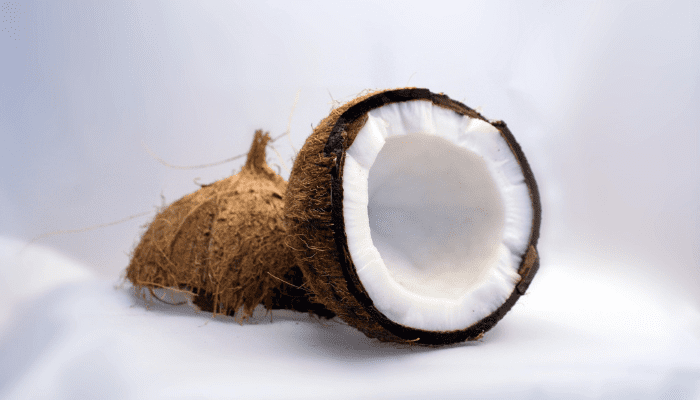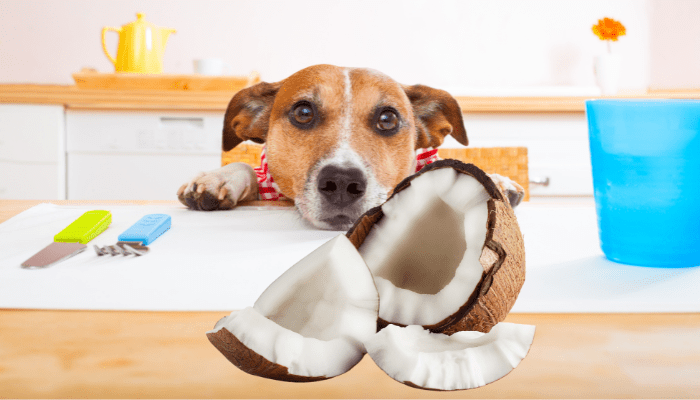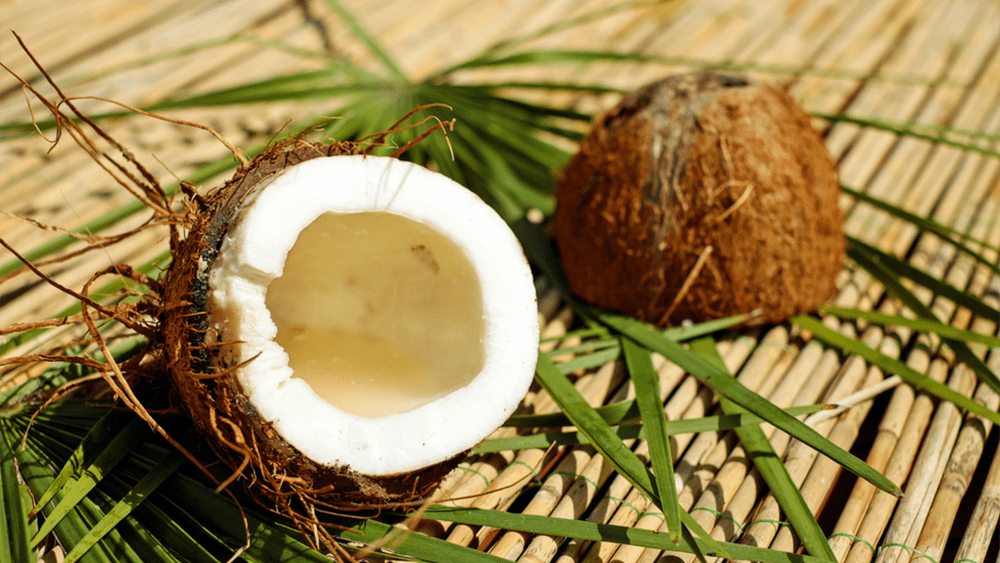Like most pet owners, you want to give your dog the best possible life. That includes providing him with healthy foods that keep him strong and fit. So can dogs eat coconut? The answer is yes, but there are a few things to remember.
In this post, we’ll discuss the benefits of coconut for dogs and how much coconut is safe for them to eat. We’ll also cover some potential risks associated with feeding dogs too much coconut. By the end of this post, you’ll be able to make an informed decision about whether or not to include coconut in your dog’s diet.
Is Coconut Bad for Dogs?
The short answer is that coconut is not poisonous to dogs. However, it may not be suitable for them. While small amounts of coconut are unlikely to harm your dog, it’s generally best to avoid feeding coconut regularly.

Is Coconut Good for Dogs?
Yes, coconut oil is good for dogs. Thanks to its nutritional benefits, it is good for dogs to consume. Coconut oil can help improve your dog’s skin and coat, as well as their digestion. Coconut oil can also help to reduce inflammation and keep your dog’s joints healthy.
Is Coconut Safe for Dogs?
Coconut is not poisonous to dogs and can be good for them in small quantities. Coconut oil, in particular, can offer a few health benefits, such as helping improve your dog’s coat and skin health.

Health Benefits of Coconut for Dogs
1. Coconut oil can improve your dog’s coat and skin.
If your dog has itchy, dry, or inflamed skin, coconut oil can help because it has skin protecting properties. The medium chain fatty acid in coconut oil can penetrate the skin and improve moisture retention. These fatty acids can lead to a healthy coat with less shedding.
2. Coconut oil can help with weight loss.
Coconut oil is rich in medium-chain triglycerides (MCTs), a type of saturated fat metabolized differently than other types of fat. MCTs are absorbed and metabolized quickly, so they’re a great energy source for dogs trying to lose weight. Adding a little coconut oil to your dog’s food can help them feel fuller longer and make it easier to cut back on calories.
3. Coconut oil can improve digestion.
The MCTs in coconut oil can also help with digestion by promoting the growth of healthy bacteria in the gut. This can lead to fewer stomach upsets and improved nutrient absorption.
4. Coconut oil can boost immunity.
The lauric acid in coconut oil has antimicrobial properties that can help fight off infection and disease. Coconut oil can also help improve circulation, which helps deliver oxygen and nutrients to cells and helps the body fight off illness more effectively.
5. Coconut oil can improve cognitive function.
As dogs age, they may experience cognitive decline, just like humans. Adding coconut oil to their diet can help improve cognitive function by providing a source of energy for the brain and promoting healthy nerve cells’ growth.

Can Dogs Eat Coconut Oil?
Coconut oil is safe for most dogs to consume in small amounts. Coconut oil has become a healthier alternative to traditional cooking oils. The amount of coconut oil you give your dog depends on size and weight. A good rule of thumb is to start with one teaspoon per day for small dogs and increase the amount by one teaspoon per day until you reach the recommended dosage of one tablespoon per day for large dogs. You can give your dog coconut oil straight from the spoon or mix it into their food.
If you are concerned about giving your dog too much coconut oil, start with a smaller amount and increase gradually as needed. You should also watch for adverse reactions, such as diarrhea or vomiting. Stop giving your dog coconut oil and consult your veterinarian if you notice any adverse side effects.
What About Coconut Water?
Coconut water is a good source of hydration for dogs. It’s full of electrolytes, which can help your dog rehydrate after a long walk or play session. Coconut water also contains potassium, magnesium, and calcium, all essential minerals for dogs.
However, it’s important to feed your dog coconut water in moderation. Too much coconut water can cause an upset stomach or diarrhea in dogs. Start by giving your dog only a small amount of coconut water to see how they react. If they don’t have any negative side effects, you can slowly increase the amount you give them.

How to Give Your Dog Coconut Water?
The best way to give your dog coconut water is to pour it into a bowl and let them drink it on their own. You can also add a little coconut water to their regular drinking water to ensure they get enough hydration throughout the day. However, be sure not to give them too much, as too much coconut water can cause stomach problems.
Can Dogs Have Coconut Milk?
Yes, dogs can have coconut milk. However, before giving your furry friend this popular dairy alternative, you should know a few things.
Is Coconut Shell Toxic to Dogs?
Coconut shell is not toxic to dogs. They can even be beneficial in small amounts. Coconut shells are a good source of fiber, which can help with digestion. They also contain lauric acid, which has antimicrobial and antibacterial properties.
That being said, there are a few things you should keep in mind before giving your dog coconut shells. First of all, they should be delivered in moderation. Too much fiber can cause gastrointestinal issues like diarrhea or constipation. Secondly, ensure the shells are clean and free of sharp edges. Splinters from the outer shell could damage your dog’s GI tract or cause an infection.
Potential Risks of Eating Coconut to Dogs
While there are some potential benefits to feeding coconut oil to dogs, there are also some risks to be aware of. The most significant risk is that coconut oil can increase your dog’s risk for pancreatitis, a severe and potentially life-threatening condition. Pancreatitis occurs when the pancreas becomes inflamed and begins to digest itself.
Symptoms of pancreatitis include vomiting, diarrhea, abdominal pain, loss of appetite, and lethargy. If you suspect your dog has pancreatitis, it’s important to take them to the vet immediately.

How to Feed Your Dog Coconut Safely?
If you want to give your dog a healthy snack, you may want to consider coconut meat. Coconut meat is the white fleshy part of the inside of a coconut. This part of the coconut is safe for dogs to eat in small quantities as a treat. When feeding your dog coconut meat, ensure it is unseasoned and unsweetened. Seasoned or sweetened coconut meat may contain ingredients that are harmful to dogs, such as chocolate or xylitol (a sugar substitute).
Coconut oil is another safe option for dogs. Coconut oil can improve your dog’s skin and coat health and can also be a food supplement. When feeding your dog coconut oil, start with a small amount (1-2 teaspoons) and work up to the recommended dosage of 1 teaspoon per 10 pounds of body weight. Be sure to use virgin or unrefined coconut oil; refined coconut oil has been processed and may contain harmful chemicals to dogs.

Final Thoughts
Overall, coconut is safe for dogs to consume in small amounts. Coconut oil, in particular, can offer several health benefits for your furry friend. Just be sure to start with a small amount and watch for any adverse reactions. If you have any concerns, consult your veterinarian.
Frequently Asked Questions
HOW MUCH COCONUT DO I GIVE MY DOG?
If your dog seems to love coconut, feed him a pinch. More than that, they may be able to have too much fat or fiber content which can cause an upset stomach due to its high amounts in both departments.
CAN DOGS EAT COCONUT FLAKES?
Coconut flakes are the perfect addition to your pup’s breakfast or snack! They’re also great when mixed with other ingredients like turmeric and oats for homemade treats. You can even use them as an all-natural cleaning agent by adding them to a spray bottle filled with water (don’t forget about safety).
WHY CAN’T DOGS HAVE COCONUT?
Coconut is a great source of nutrition for our furry friends, but it does have some downsides. The consumption of coconut may cause gastric upset and bloating in dogs because they contain medium-chain triglycerides (MCTs). You’ll want to check with your vet before giving them this foodstuff.
WHY CAN’T DOGS HAVE COCONUT?
Coconut is a great source of non-toxic fuel for your dog’s body. However, it also contains medium-chain triglycerides that may cause gastrointestinal upset and bloat, but it can be given with confidence if you check in advance with the vet.






